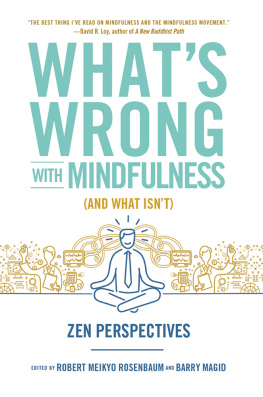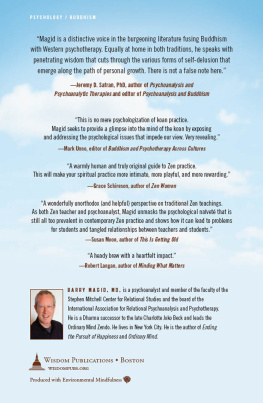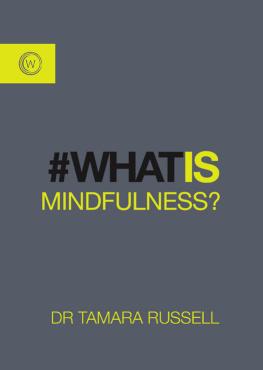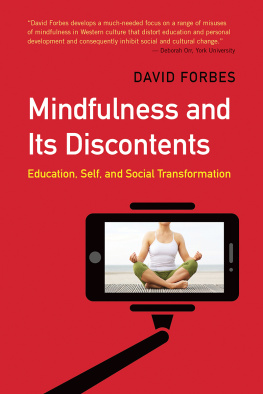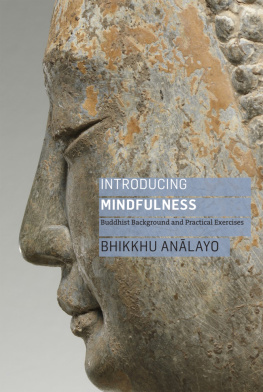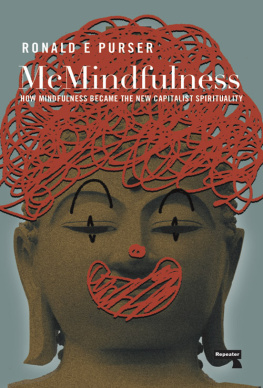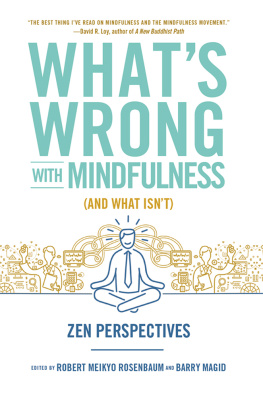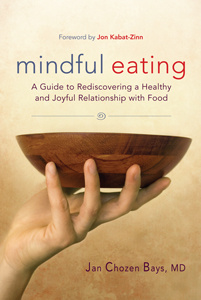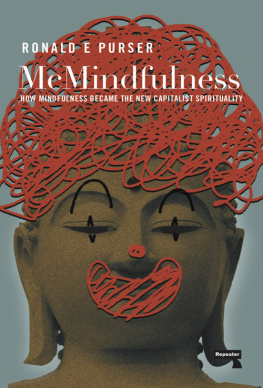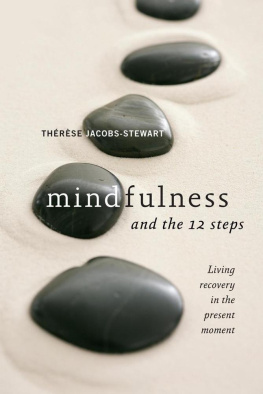PRAISE FOR
WHATS WRONG WITH MINDFULNESS
The essays illuminate each other, like the facets of a jewel.
Linda Galijan, San Francisco Zen Center
I am awed, appreciative, and impressed by the daring of the editors to examine the meaning of the word mindfulness and how it is being lived.
Elana Rosenbaum, author of Being Well (Even When Youre Sick)
Raises urgent questions about Mindfulness capital M now that it has been extracted from its Buddhist roots.
Gaelyn Godwin, abbot, Auspicious Cloud Temple, Houston Zen Center
If youre really into mindfulness, if you really want to know about mindfulness deeply, then this is a book for you to read and, more, to contemplate. Be prepared to be moved.
Arthur C. Bohart, professor emeritus, California State University, Dominguez Hills

Wisdom Publications, Inc.
199 Elm Street
Somerville, MA 02144 USA
wisdompubs.org
2016 Robert Rosenbaum
2016 Barry Magid
All rights reserved.
No part of this book may be reproduced in any form or by any means, electronic or mechanical, including photography, recording, or by any information storage or retrieval system or technologies now known or later developed, without permission in writing from the publisher.
Library of Congress Cataloging-in-Publication Data
Names: Rosenbaum, Robert, editor. Magid, Barry, editor.
Title: Whats wrong with mindfulness (and what isnt) : Zen perspectives / edited by Robert Meikyo Rosenbaum and Barry Magid.
Description: Somerville : Wisdom Publications, 2016. | Includes bibliographical references and index.
Identifiers: LCCN 2016000557| ISBN 9781614292838 (pbk. : alk. paper) | ISBN 1614292833 (pbk. : alk. paper)
Subjects: LCSH: Meditation Buddhism. | Zen Buddhism Doctrines.
Classification: LCC BQ5612 .W48 2016 | DDC 294.3/442 dc23
LC record available at https://lccn.loc.gov/2016000557
ISBN 978-1-61429-283-8 ebook ISBN 978-1-61429-307-1
20 19 18 17 16 5 4 3 2 1
Cover design by Philip Pascuzzo. Interior design by Jordan Wannemacher.
Set in Minion Pro 10.25 pt. /15 pt.
Norman Fischer's poem Solitude was previously published in James Year's online magazine Across the Margin.
When Mindfulness Is Too Much and the dialogue between Gil Fronsdal and Max Erdstein was originally published in Inquiring Mind 31, no. 2 (Spring 2015). 2015 by Inquiring Mind. inquiringmind.com. It is reprinted by permission of Inquiring Mind.
The epilogue is reproduced by permission of SAGE Publications Ltd., London, Los Angeles, New Delhi, Singapore, and Washington, DC, from Robert H. Sharf, Is Mindfulness Buddhist? (And Why It Matters), Transcultural Psychiatry, Copyright Robert H. Sharf, 2014.
ARTICULATE AND COURAGEOUS, THIS BOOK EXPANDS OUR UNDERSTANDING OF MINDFULNESS AND MERGES DEEP RESPECT FOR TRADITION WITH THOROUGH ACCEPTANCE OF CONTEMPORARY TIMES.
Deborah Schoeberlein David, author of Living Mindfully

MINDFULNESS IS IN FASHION. Oprah loves it, Google teaches it to employees it has become widespread as a cure-all for stress, health problems and psychological difficulties, interpersonal trouble, and existential anxiety. But in the context of the Zen Buddhist tradition, what more might mindfulness have to offer?
The Zen teachers gathered here each offer a powerful perspective on what mindfulness means, its strengths, and the potential pitfalls of decontextualizing mindfulness practice:
- GIL FRONSDAL AND MAX ERDSTEIN THOUGHTFULLY EXPLORE THE RICH THERAVADAN ROOTS OF MINDFULNESS
- BARRY MAGID AND MARC POIRIER EXAMINE THE UNINTENDED SIDE EFFECTS OF EXPOSING A SPIRITUAL TRADITION TO THE DEMANDS OF CAPITALISM
- NORMAN FISCHER DEMONSTRATES HOW MINDFULNESS INFORMS HIS CREATIVE PROCESS
- SALLIE JIKO TISDALE ON MINDFULNESS MIXED INTO A POTPOURRI OF SPIRITUAL, MYSTICAL, AND SELF-HELP METHODS
- AND MORE, INCLUDING ESSAYS ON MINDFULNESS AND ENVIRONMENTALISM, SCIENCE, AND PSYCHOLOGY.
Each chapter offers insights to ground mindfulness in a deeper understanding of both where it comes from and where it might be headed.
INTRODUCTION
UNIVERSAL MINDFULNESS BE CAREFUL WHAT YOU WISH FOR?
Robert Meikyo Rosenbaum and Barry Magid
ZEN TEACHERS SPEAK TO MINDFULNESS
Half a century ago, Zen was the magic elixir that would save all of us in the West from ourselves. Beat poetry, the inner game of tennis, and the art of motorcycle maintenance even the nostrums of business management manuals all claimed to bear Zens imprimatur. Zen, with its spare aesthetic and paradoxical stories, seemed to offer an antidote to the stresses of conformity and the false promises of commercialism. As a bonus, it apparently provided a tried and true pathway to enlightenment for the spiritual seeker.
With time we learned that Zen is as it likes to proclaim nothing special. Its practitioners are not exempted from ordinary human frailties. Throughout its history in Asia, Zen, far from being the rarefied panacea we had imagined, suffered its disappointments and its scandals, its organizational struggles, personal rivalries, and internecine doctrinal conflicts. Zen in America and Europe also turned out to not be immune from muddles and missteps. This was disillusioning but also, ultimately, refreshing: rather than pretending to be some precious, idealized practice, Zen in the West had to become real.
Being real means engaging with all the bits and pieces of everyday life. But what should that look like? A series of woodblock prints famous in the Zen tradition the Ox-Herding Pictures depicts the various stages of a spiritual journey. The tenth and final picture depicts the culmination of practice as returning to the marketplace with bliss-bestowing hands. The marketplace represents the hubbub of daily life with its jostle and noise, its glitter and its dust; this tenth Ox-Herding picture offers a vision of how a mature practitioner, forged by the rigors of the long quest, is able to return to everyday affairs and be in the world but not of it. Appearing as deeply ordinary, still she lives a life that supports the liberation of all beings.
In Zen we like to say the lotus blooms in the mud and the mud is pretty interesting, too. Since its arrival in the West, Zen has had its share of mud: teachers who did not live up to the ethical standards expected of them; difficulties supporting some practice centers while other groups thrived using commercial business models; arguments about how to stay true to tradition while also fostering the emergence of new forms of practice. In spite of and sometimes even because of these difficulties, Zen in the West has provided a deeply satisfying spiritual path for many, and the liberation it offers not only survived its journey to the West but has arguably been reinvigorated as its devoted practitioners struggled to make sense of it in its new time and place.
Now it is mindfulnesss turn to be appropriated by Western culture as the philosophers stone. Sometimes idealized as a cure-all and sometimes vilified as a New Age pablum, it has spread into society at large and, like Zen, expanded beyond its original training venues, religious practices, and cultural contexts. Mindfulness is becoming a generic term whose meaning becomes less clear in direct proportion to the hype it generates. It can be found everywhere; corporate retreats, medical centers, sports facilities, and even the military have adopted it as a way to decrease stress and improve performance.
Next page
